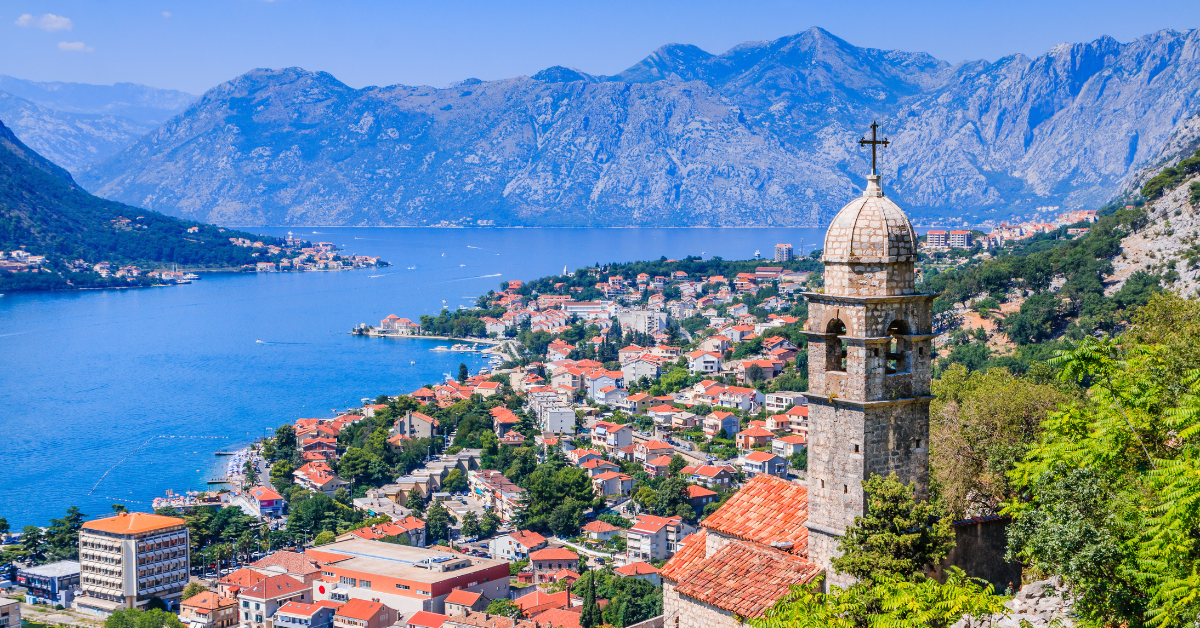The country of Montenegro is represented in Japanese kanji as “黒山” (Black Mountain), a literal translation of its original name. For Japanese people, this name conveys majestic landscapes, a rich history, and a sense of mystery, making the country more than just a tourist destination.
The Origin of the Kanji Representation “黒山”
The name “Montenegro” comes from the Italian words “Monte” (mountain) and “negro” (black). In the local Slavic language, it is called “Crna Gora,” which also means “Black Mountain.” In Japanese, this was translated literally as “黒山” (Black Mountain).
| Language | Expression | Meaning |
|---|---|---|
| Italian | Monte Negro | Black Mountain |
| Slavic (local language) | Crna Gora | Black Mountain |
| Japanese Kanji | 黒山 | Black Mountain |
Thus, the national name directly reflects the natural features, and it is clear that Montenegro’s rugged mountains and dense forests are embodied in its very name.
Japanese Impressions of Montenegro
The impressions Japanese people have of Montenegro can be divided into several aspects.
- Majestic Nature
The Adriatic coastline with its transparent sea, the dramatic mountain ranges, and the Tara Canyon leave a strong impression on Japanese visitors. - Historical Depth
The walled medieval towns and monasteries remind visitors of Montenegro’s role as a crossroads of European and Eastern cultures. - Mystical Character
The kanji “黒山” itself conveys a mystical resonance in Japanese, reinforcing the symbolic way in which the nation is perceived.
The Meaning of the Expression “黒山”
The kanji “黒山” leaves a striking impression visually and linguistically. The character “黒” (black) suggests mystery and solemnity, while “山” (mountain) symbolizes greatness and permanence in nature. Combined, they create an image of enduring natural power and grandeur.
For example, in Japan, names like “Black Fuji” or “Black Peak” evoke a sense of strength and mystery. In the same way, the name “黒山” gives Montenegro a symbolic status in the Japanese mind.
Montenegro from the Perspective of Sports
Despite its small size, Montenegro holds a strong presence in the sporting world.
- Water Polo
Considered a national sport, Montenegro’s water polo team consistently ranks among the top in international tournaments. Their strength in water polo is a source of national pride and a symbol of the country itself. - Football (Soccer)
Since independence, Montenegro has competed in European qualifiers against world-class teams. Their fighting spirit, despite being a small nation, supports the image of “a united country that does not back down.” - Basketball
The nation has produced NBA players, and its athletes are recognized for both physical strength and tactical intelligence.
| Sport | International Standing | Japanese Impression |
|---|---|---|
| Water Polo | Among the world’s best | A nation of strength and strategy |
| Football | Visible presence in European qualifiers | A small nation with fighting spirit |
| Basketball | Produces NBA players | A nation connected to the world |
Sports serve as a major factor, alongside culture and tourism, in making Montenegro known to the world.
Japan–Montenegro Exchange and Impressions
Tourism and cultural exchange play an important role in how Japanese people come to know Montenegro.
- Tourism
The UNESCO World Heritage town of Kotor, the coastal resort of Budva, and Durmitor National Park are especially popular among Japanese travelers. - Culture
Montenegro preserves traditions while also inheriting aspects of former Yugoslav culture. Folk music and dance remain widely appreciated. - Sports Exchange
Through water polo and football matches, Montenegro’s name has become familiar to Japanese fans. Sports have created a new kind of connection and a sense of familiarity.
| Tourist Spot | Features | Japanese Impression |
|---|---|---|
| Kotor | UNESCO World Heritage medieval town | A taste of the Middle Ages |
| Budva | Coastal resort | A hidden Mediterranean paradise |
| Tara Canyon | One of the world’s great canyons | Awe-inspiring nature |
Society and Daily Life in Montenegro
Beyond tourism and sports, everyday life in Montenegro also shapes Japanese impressions.
- The food culture is a blend of Mediterranean and Balkan influences, making frequent use of olive oil and seafood.
- Montenegrins are known for valuing family and welcoming foreign visitors warmly.
- Tourism has become a pillar of the economy, creating a space for multicultural interaction.
| Aspect | Features | Japanese Perception |
|---|---|---|
| Food Culture | Blend of Mediterranean and Balkan | Healthy and approachable |
| National Character | Strong family values | Warm and kind |
| Economy | Tourism-centered | A hub of multicultural exchange |
The lifestyle and cultural attitude of Montenegro deepen the meaning of “黒山,” giving Japanese visitors a sense of comfort and familiarity.
Conclusion
The kanji representation of Montenegro, “黒山,” is a literal translation of its name, but it has become more than that. It symbolizes majestic nature, historical weight, and the strength of its sports culture.
For Japanese people, Montenegro is seen as a land of nature, a country of history, and a strong sporting nation. Tourism and cultural exchange have further enriched this impression.
Although small in size, Montenegro continues to shine on the global stage, and for Japanese people, it will remain remembered as a nation that embodies the very meaning of “Black Mountain” — a country of grandeur and strength.






